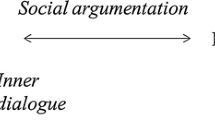Abstract
Paradigm-dialogues are important for several reasons. One reason is to clarify what kind of paradigmatical aspects do have an effect on choosing a qualitative or quantitative research method. To be successful a paradigm-dialogue should have informational quality, self-reflective quality, argumentative quality and communicative quality. The argumentative quality, however, should not be of a persuasive or competitive nature because of the partial a-rationality of paradigms. Paradigm-dialogues should be aimed at self-clarification, mutual understanding and sharing learning processes. That is why communicative quality is important to protect and to promote argumentative quality of a non-persuasive kind. Communicative quality should be understood in terms of striving for a dialogical relationship which is characterized by interactivity, communicative symmetry, openness, multiple hermeneutics, mutual trust and respect. Communicative symmetry is feasible and desirable. An ironic attitude may be helpful.
Similar content being viewed by others
References
Blaikie, N. W. (1991). A critique of the use of triangulation in social research. Quality & Quantity, 25: 115–136.
Boer, Th. De (1978). Hermeneutiek en ideologiekritiek. In: H. Kunneman (ed.), Wetenschappen ideologiekritiek. Meppel/Amsterdam: Boom, pp. 96–134.
Boog, B., H. Coenen, L. Keune & R. Lammerts (eds) (1996). Theory and Practice of Action Research. With special reference to The Netherlands, Tilburg: Tilburg University Press.
Cockcroft, R. & S. M. Cockcroft (1992). Persuading People. An Introduction to Rhetoric. London: Macmillan.
Coenen, H. (1987). Handelingsonderzoek als exemplarisch leren. Groningen: Konstapel.
Elders, F. (1996). Dialogue and meaning. In: Dialogue and Universalism, Vol. 6, Nos. 5–6, pp. 27–40.
Flood, R. L. & N. R. A. Romm (1996). Diversity Management. Triple Loop Learning. Chichester: Wiley.
Gadamer, H.-G. (1960). Wahrheit und Methode. Grundzüge einer philosophischen Hermeneutik. Tübingen: Mohr.
Giddens, A. (1976). New Rules of Sociological Method. London: Hutchinson.
Guba, E. G. (1990). The alternative paradigm dialog. In: E. G. Guba (ed.), The Paradigmdialog. Newbury Park: Sage, pp. 17–30.
Habermas, J. (1971). Vorbereitende Bemerkungen zu einer Theorie der kommunikativen Kompetenz. In: J. Habermas & N. Luhmann (eds), Theorie der Gesellschaft oder Sozialtechnologie — Was leistet die Systemforschung? Frankfurt am Main: Suhrkamp Verlag, pp. 101–141.
Habermas, J. (1973). Wahrheitstheorien. In: H. Fahrenbach (Hrsg.), Wirklichkeit und Reflexion: Pfüllingen: Neske, 211 vv.
Halfpenny, P. (1997). The relation between quantitative and qualitative social research. Bulletin de Méthodologie Sociologigue 57: 49–64.
Hermans, H. J. M. & H. J. G. Kempen (1993). The Dialogical Self. Meaning as Movement. San Diego: Academic Press.
Heron, J. (1996). Co-Operative Inquiry. Research into the Human Condition. London: Sage.
Holquist, M. (1990). Dialogism. Bakhtin and his World. London: Routledge.
Kellendonk, F. (1986). Idolen. From: Oprecht veinzen. In: F. Kellendonk (1992), Het complete werk. Amsterdam: Meulenhoff, pp. 847–860.
Kuhn, Th. S. (1970). The Structure of Scientific Revolutions. Chicago: University of Chicago Press (2nd edn).
Kuhn, Th. S. (1977). The Essential Tension. Chicago: University of Chicago Press.
Kunneman, H. (1986). De waarheidstrechter. Een communicatietheoretisch perspectief opwetenschap en samenleving. Meppel/Amsterdam: Boom
Lincoln, Y. S. & E. G. Guba (1989). Fourth Generation Evaluation. Newbury Park: Sage.
Linell, P. (1990). The power of dialogue dynamics. In: I. Markovà & K. Foppa (eds), The Dynamics of Dialogue. New York: Harvester Wheatsheaf, pp. 147–177.
Marsh, D. (1980). The Quattrocento Dialogue. Classical Tradition and Humanist Innovation. Cambridge: Harvard University Press.
Reason, P. (ed.) (1994). Participation in Human Inquiry. London: Sage.
Rorty, R. (1989). Contingency, Irony and Solidarity. Cambridge: Cambridge University Press.
Smaling, A. (1994). Paradigmatic and pragmatic aspects of choosing a qualitative or quantitative method. Quality & Quantity 28: 233–249.
Smaling, A. (1995). Open-mindedness, open-heartedness and dialogical openness: the dialectics of openings and closures. In: I. Maso, P. Atkinson, S. Delamont & J. Verhoeven (eds), Openness in Research. Assen: Van Gorcum, pp. 21–32.
Smaling, A. (1996a). Qualitative interviewing: contextualization and empowerment. In: I. Maso & F. Wester (eds), The Deliberate Dialogue. Brussel: VUBpress, pp. 15–28.
Smaling, A. (1996b). Argumentation, cooperation and charity in qualitative inquiry. In: Dialogue and Universalism, Nos. 5–6, pp. 163–172.
Smaling, A. (1998). Dialogical partnership — The relationship between the researcher and the researched in action research. In: B. Boog, H. Coenen, L. Keune & R. Lammerts (eds), The Complexity of Relationships in Action Research. Tilburg: Tilburg University Press, pp. 1–16.
Smith, J. K. & L. Heshusius (1986). Closing down the conversation: the end of the quantitativequalitative debate among educational inquirers. Educational Researcher 15: 4–12.
Snyder, J. R. (1989). Writing the Scene of Speaking. Theories of Dialogue in the Late Italian Renaissance. Stanford, Cal.: Stanford University Press.
Author information
Authors and Affiliations
Rights and permissions
About this article
Cite this article
Smaling, A. What Kind of Dialogue Should Paradigm-Dialogues Be?. Quality & Quantity 34, 51–63 (2000). https://doi.org/10.1023/A:1004747524463
Issue Date:
DOI: https://doi.org/10.1023/A:1004747524463




